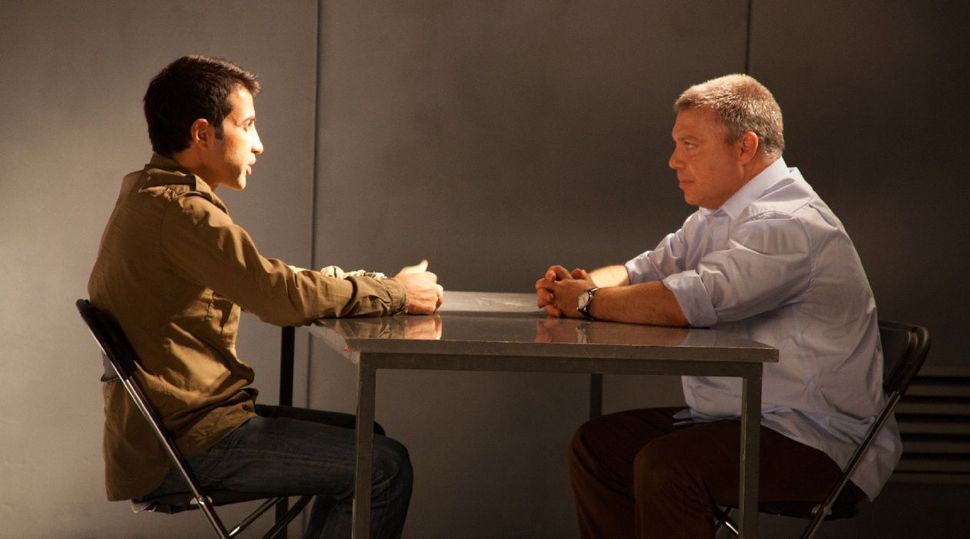The Spy Who Came In From Hamas

Prince of the City: ‘The Green Prince’ focuses on the relationship between Mosab Hassan Yousef (left) and his Israeli handler. Image by Music Box Films
With the situation in Israel and the Palestinian territories constantly shifting between open conflict and frail cease-fires this summer, the release of the documentary “The Green Prince” could not be timelier. Directed by Nadav Schirman, the film, which opens on Friday in New York, tells the story of Mosab Hassan Yousef, the son of Hamas leader Sheikh Hassan Yousef. Mosab worked as a spy for the Israeli Shin Bet between 1997 and 2007.
“The Green Prince” recounts how Mosab Yousef had been full of hate for Israel when he was a teenager, then had a change of heart after witnessing Hamas members torture others in prison. Some of his missions for the Shin Bet are discussed, but much of the film focuses on Mosab’s relationship with Gonen Ben Yitzak, his handler at the security agency. The relationship grew in trust to such an extent that Gonen risked persecution by revealing his identity in order to strengthen Yousef’s asylum plea in the United States in 2010.
Consisting of interviews with Gonen and Mosab as well as some re-enacted — and some real! — surveillance footage, the one-hour, forty-minute documentary is gripping and moving, as it effectively tells one small, positive yet tragic story the decades-long conflict has created. The Forward’s Anna Goldenberg sat down with director Schirman and Yousef to discuss tolerance, the importance of having a moral compass and the role of cinema in shaping society.
Anna Goldenberg: How did this film come about?
Nadav Schirman: A friend of mine had alerted me about Mosab’s book [“Son of Hamas”]. I got a copy of it and read it in two hours. I think it’s one of the few books I devoured, because inside I saw Mosab’s inside perspective on Hamas, which was totally new to me. I’d never understood the nature of Hamas. And these were our neighbors. I was living in Germany, but I am from Israel originally. This was a major eye-opener. And then I was introduced by one of our associate producers to Gonen [Ben Yitzhak], and when I understood the nature of the relationship between Mosab and Gonen, I had goose bumps in that meeting. I really felt a sense of hope like I’ve never felt before. It wasn’t just a word, it was a very tangible feeling.
In mid-August, Hamas killed 18 alleged collaborators with Israel. Mosab, what do we in the West get wrong about Hamas?
Mosab Hassan Yousef: People here in the West are not in touch with reality in the Middle East, like people in the Middle East are not in touch with the reality of the people who live in the West. There are many wars of isolation, but in my opinion the human condition is the same. Whether it is in the West or the East, people are stuck in their cages of revenge and hatred. They justify what they do. The Hamas people, under the pressure of revenge, do crazy things, and they think that they have the right to do that. I hope sometime soon there will be maturity, and they will get to see that the violent way is not the way. Tolerance, understanding, acceptance and unconditional forgiveness and love are the true foundations that help us survive. All other options or alternatives to love and forgiveness will lead us to self-destruction. It’s not only about the collaborators you see being executed, it’s not only about launching missiles. They are also killing their political rival movements and their rival movements in the West Bank. A father kills his daughter for shame. A brother kills his married sister for shame. We see many, many manifestations of violence in that region. I hope this work will open the eyes of a whole new generation to think for themselves and transcend their mental barriers.
You said that people who watched the film have reacted to it very strongly in a positive way. What should people do if they are moved by the film?
Mosab Hassan Yousef: I think this is up to every individual. This could be uplifting to many, and it could be depressing to some. If people choose to see this in a hopeful way, it will give them this sense of hope that is possible. We’re not asking people to go demonstrate; we just want to sow this seed of hope. It’s like a master seed: It becomes a big tree at some point.
Nadav Schirman: There is a matter of responsibility that’s in the story because both you and Gonen felt really responsible — whether it was for your family, for your people, for your moral well-being — and then to act upon that sense of responsibility. If the film inspires you to follow your moral compass in any situation — it could be at work, it could be at home, it can be in politics — then we did something right.
Mousab Hassan Yousef: There are many people who went through hell in their lives, and they stayed firm. They followed the soul. The environment was so strong it could shape stones, but for them it was that they decided how to shape themselves. So, you’ll find many stories. This story, thankfully, found the light. One story is not going to change the world. But this story is one manifestation of millions of other manifestations. And this is what keeps us alive. This whole concept of cinema, this giant screen where technology, philosophy, values and talent come together to show us on this mirror a big reflection of who we are. This is why Hollywood and cinema in general shaped our destiny somehow.






















